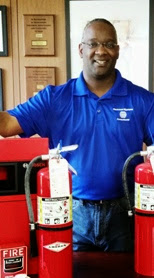Tuesday, October 3, 2017
Fire Code is Essential For Proper Installation and Maintenance of Fire Extinguishers
Thursday, December 1, 2016
NFPA Says There's a Fire Every 23 Seconds
Wednesday, March 30, 2016
Choosing the Right Fire Extinguisher for a Vehicular Fire
 On the 16th of this month I told you about the heroic action by two of ESC’s finest technicians, Scott Camps and Wayne Clay (ESC Commends Workmen for Roadside Heroics).
On the 16th of this month I told you about the heroic action by two of ESC’s finest technicians, Scott Camps and Wayne Clay (ESC Commends Workmen for Roadside Heroics).
Today I’d like to expand on their story just a bit in order to assist you in better understanding what type of fire extinguisher they used, how they used it, and why they chose it instead of several other types.
When Scott and Wayne arrived on the scene of a burning car at the corner of 3rd and Mound St in Columbus, Ohio, the first thing both techs did without a single word was to grab ABC-type extinguishers.
Scott says, “Essentially ABC fires extinguisher cover 3 different classes of fire those are your most common fires, such as plastics, electrical, paper and wood. ABC fire extinguisher is a universal extinguisher you can use it on multiple fires.”
 | There essentially are four types of fire extinguishers to choose from:
|
“You can’t use water on a vehicle fire because you can’t use water to put out a gas- or oil-based fire. To do so would more than likely spread the fire with the other fluids that a car has,” says Scott.He also says that because he use to be a fire fighter, he knew to approach the burning vehicle at a 45-degree angle from the front. He began spraying the vehicle at the tires to keep them from exploding. Then he sprayed under the hood.
“A burning vehicle is difficult to put the fire out because it could explode. You have the gas tank and the tires to consider,” says Wayne. “This could cause severe injuries to those nearby.”I invite you to read on and learn more about the various fire extinguishers you have in your vehicles and your facilities (Use The Right Portable Fire Extinguisher). In addition, please use our fire extinguisher code and service page to learn even more (Fire Extinguishers).
If you need assistance, please think of ESC and be sure to give us a call. I or one of my skilled, knowledgeable staff will be happy to assist you! Call us at 614-754-1393 or send us a comment or question using our quick response forms on the right or below.
Thank you, and have a safe and prosperous day!
John Larkins
ESC Senior Partner


Contact ESC: |

TpromoCom
Wednesday, March 16, 2016
ESC Commends Workmen for Roadside Heroics
 In a world where so many of us look to someone else for protection when bad things take place, it’s gratifying for me to bestow a vote of thanks for two of my own ESC technicians-- Scott Camps and Wayne Clay --for the heroics they performed at the corner of 3rd and Mound as they were coming off of Rt. 70.
In a world where so many of us look to someone else for protection when bad things take place, it’s gratifying for me to bestow a vote of thanks for two of my own ESC technicians-- Scott Camps and Wayne Clay --for the heroics they performed at the corner of 3rd and Mound as they were coming off of Rt. 70.
“We saw the smoke as we were coming off of 70,” says Scott Camps, our lead fire suppression tech at ESC. “By the time we arrived on the scene, the fire had engulfed the car.”
 Scott Camps |  Wayne Clay |
|---|
“The fire was nearly out when the fire department arrived,” Camps finished.So may I say thank you for a job well done to Scott Camps and Wayne Clay! I’m proud of you and so glad to have you working with us here at ESC! Frankly, everyday it’s all about safety and what Scott and Wayne did exemplifies our company’s work philosophy exactly. Thank you!
John Larkin, Senior Partner
Electronic Systems Consultants LLC


Contact ESC: |

TpromoCom
Tuesday, December 23, 2014
Fire Code and Aged Fire Extinguishers
 Question:
Question:Our staff found several older fire extinguishers in our warehouse that have full pressure. The last date of inspection was in September 1999. Can we use them?
Answer:
The short answer to this question is, “No, it’s not recommended that you use expired extinguishers in a fire situation,” says John Larkin, senior partner with Electronic Systems Consultants (ESC).
According to Larkin, per code, all dry chemical fire extinguishers must receive two (2) inspections that require the extinguishers to be fully emptied and certified, regardless if the extinguisher is showing a full charge or not.
“A dry chemical or ABC fire extinguisher requires a six year maintenance or twelve year hydrostatic test from its date of manufacture. Both procedures call for the bottles to be emptied for internal inspection and for the hydrostatic test to perform a pressure test of the bottle,” says Larkin. “All other years in between those services, a multi-point visual inspection is conducted to ensure the extinguisher is ready to be of service in cases of fire emergencies.”
For more information on the use of fire extinguishers, check out Use The Right Portable Fire Extinguisher, published on ESC's website on December 1, 2014.
If you have a fire protection- or security-related question, please email it to John at: john@esc-ohio.com. Your question will appear in the ESC blog and you’ll receive an email letting you know when and where to look.


